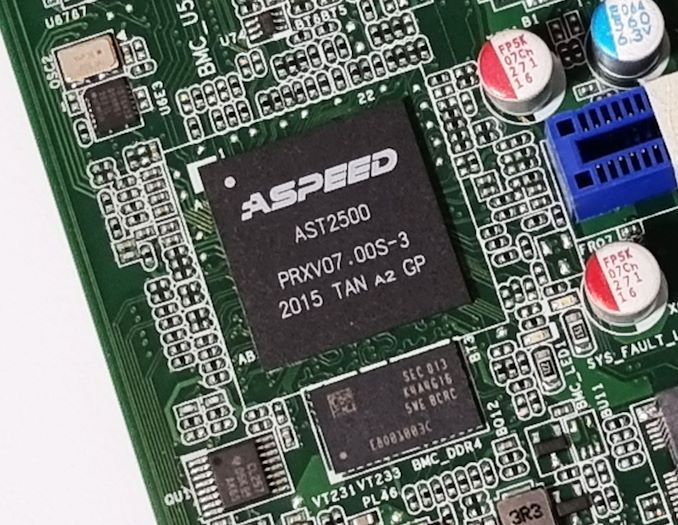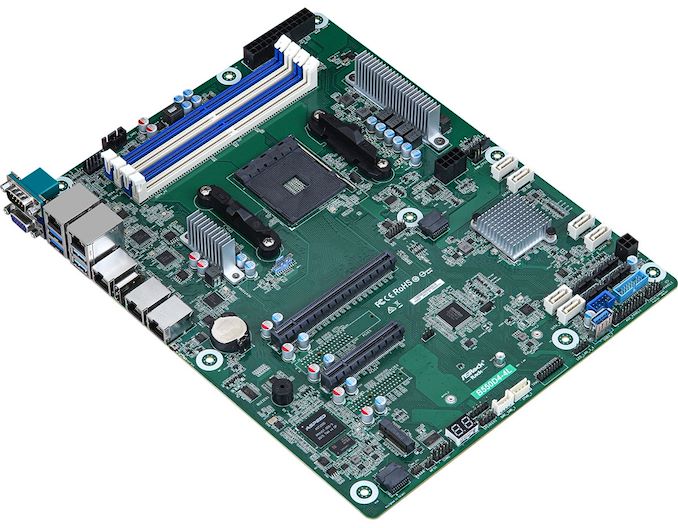ASRock Rack B550D4-4L Motherboard Review: B550 Goes Professional with BMC
by Gavin Bonshor on May 20, 2021 9:00 AM ESTConclusion
Not every motherboard is created equally, nor is every motherboard created with the same functionality as other models. Typically as seen on Intel platforms, it has its consumer-level chipsets such as B560, Z590, Z490, etc, but it also has a level pegged W480 chipset for professional users, which falls outside of its typical industrial level Xeon Scalable platform. Looking at AMD, it doesn't really do this with its desktop platforms, and users looking for workstation-level performance with consumer-level functionality can opt for Threadripper. The other options include Ryzen for desktop, and EPYC for enterprise, cloud, and server, with no real in-between.
When we first got wind of the ASRock Rack B550D4-4L back in January, it piqued our interest as it's the only known board to us that uses AMD's B550 desktop chipset to feature a BMC controller, in this case, an ASPEED AST2500, which is commonly used on professional level boards such as this. Another unique feature of the B550D4-4L is that it has four Intel Gigabit Ethernet ports on the rear, with a fifth designed to provide users access to the board's IPMI, for remote access purposes.
Being on an AMD Ryzen desktop platform, this allows users to use PCIe 4.0, with one full-length PCIe 4.0 x16 slot, and one half-length PCIe 4.0 x4 slot. Typically B550 boards only have one PCIe 4.0 slot, and this is where the B550D4-4L opts for a second PCIe 4.0 slot over a Gen 4 M.2 slot. Instead, the board has one PCIe 3.0 x4 M.2 slot, which supports SATA. As we know, the B550 chipset itself uses PCIe 3.0 lanes, and ASRock Rack is routing this through AMD's modular chipset and tracing to add the second PCIe 4.0 x4 half-length slot. Other storage options include six SATA ports, with four from the chipset with RAID 0, 1, and 10 support, and two via an ASMedia ASM1061 SATA controller.
Functionality and usability are two key parameters to look for in a server-focused model, and the B550D4-4L provides plenty of this, with an intuitive and accessible IMPI interface. We've highlighted that the ASRock Rack IPMI is functional in previous reviews, and the B550D4-4L is no different in this regard. There is also plenty of functionality within the firmware, with B550 specific options including access to AMD Ryzen's Precision Boost Overdrive settings, as well as an LN2 mode, which seems completely out of tune with the board's core values. We really wouldn't recommend overclocking a Ryzen 3000 or 5000 series desktop processor on this board, primarily due to the design of the 4+2 power delivery, and the inadequate heatsinks designed to cool it.

The ASPEED AST2500 BMC chip on the ASRock Rack B550D4-4L motherboard
Focusing on the performance, and the B550D4-4L was surprisingly competitive when compared to other B550 models, not just in our system testing, but in our computational benchmarks too. It has Precision Boot Overdrive (PBO) applied by default, which allowed our Ryzen 7 3700X processor to stretch its legs a little, especially when cooled with our Corsair H150i Elite Capellix 360 mm AIO cooler. The only negative in performance came in our DPC latency testing, with our results showing that this board isn't suitable for DAW systems. In the firmware, we did try setting the same settings as other B550 models on test, but no matter what we inputted in relation to memory settings, the latencies wouldn't change on our memory and resulted in DDR4-3200 with CL22 latencies; this would have a negative impact on general compute performance, but with DDR4-3200 CL16, we would expect it to be highly competitive with other models we've tested.
Final Thoughts
The ASRock Rack B550D4-4L at the time of writing is in a league of its own, with no other AMD B550 series motherboards offering a BMC controller. Another factor to consider here is we haven't been able to find this model anywhere at retail, and we don't have any official MSRP pricing at this time. This makes it tricky, to sum up as it's hard to recommend a model we can't physically get our hands on globally. We do expect the B550D4-4L to be available at retail at some point, and when it eventually is, it offers an interesting professional-level take on AMD's consumer B550 platform.
It keeps up with other B550 in terms of performance which is surprising, but it also has an excellent IPMI interface for easy access and usability. This makes the B550D4-4L one of the most interesting B550 models we've seen so far, especially with four Gigabit Ethernet ports.











73 Comments
View All Comments
fmyhr - Thursday, May 20, 2021 - link
While this is true, AMD and motherboard manufacturers are distressingly cagey about whether ECC and ECC error reporting actually work. If you care about this, you need to do your own searches. There have been cases of ECC support being added or removed on successive motherboard BIOS revisions. The different mainstream mfgs have different attitudes regarding ECC RAM: MSI pretty much ignores it, Gigabyte says they support ECC on _some_ boards, Asus seems somewhat better, and ASRock appears to be the best bet. If only Supermicro would give us a non-Threadripper Ryzen board...AntonErtl - Friday, May 21, 2021 - link
AFAIK all ASUS (as well as all Asrock) boards support ECC. We have several servers with (working) ECC with Ryzen CPUs (without Pro): 1600X, 1800X, 3700X, 3900X, 5800X. If AMD sold the Pro models in retail and guaranteed ECC functionality, we would be willing to pay a little extra for that. As for the Pro models, I once compared the specification of one with the corresponding non-Pro model, and wrt ECC they were the same. Can anyone name a Pro model where AMD guarantees more ECC functionality?mode_13h - Friday, May 21, 2021 - link
The difference between ECC support of Pro and non-Pro CPUs is supposedly that AMD only tests and guarantees it on the Pros. For the non-Pro CPUs, it's up to the motherboard vendor to test and support.As for APUs, AMD disables ECC support on the non-Pro APUs. I guess that's because the main customers for APUs with ECC are corporations, and so it's like a favor to big OEMs, giving them a lock on the corporate market (since the Pro versions seem to be EOM-only).
mode_13h - Friday, May 21, 2021 - link
> EOM-onlytypo: should be OEM-only.
Slash3 - Friday, May 21, 2021 - link
Correct. The board does indeed support ECC in that way. Gavin misinterpreted the specifications; no idea why, as it is quite clear.https://www.asrockrack.com/general/productdetail.a...
"DDR4 288-pin ECC*/non-ECC UDIMM
* For AMD Ryzen Desktop Processors with Radeon Graphics, ECC support is only with Processors with PRO technologies."
Non-Pro APUs have always been the exception, and do not support ECC on any platform.
Jorgp2 - Friday, May 21, 2021 - link
>Uhh.. ECC memory works just fine with bog standard (aka "not Pro") Ryzen CPU's and has LITERALLY since their launch in 2017.I don't think you understand what kind of board this is.
If the data sheet says it only supports ECC for select SKUs, then it only supports ECC for select SKUs.
There is no halfway for the target market.
leexgx - Friday, June 18, 2021 - link
Ecc functionality still works even with the non-pro CPUs (just official stance is it doesn't work even thought it does, not like Intel where if its an i5 or higher ecc automatically doesn't work) ddr5 is going to change this problem with Intel as ecc is baked into ddr5 and can't be disabled and sold "as a enterprise" featureMeJ - Friday, May 21, 2021 - link
"The B550D4-4L also doesn't include integrated audio, so users looking to build an audio workstation will need to rely on external audio controllers."With respect, this comment is illogical. I have never heard of any DAWorkstation using on-board audio, and don't ever expect to. NOT having on-board audio to disable is a major advantage for a DAW. Also, the DPC issues here are perhaps characteristic of early drivers. There is no inherent reason I can see for this board to have worse performance than others with the same chipset... Is there? I agree that 10G would be preferred for a DAW.
mode_13h - Friday, May 21, 2021 - link
Lol. Yeah, integrated audio on server boards that even have it tends to be a minimal implementation, with lots of crosstalk and interference.mode_13h - Friday, May 21, 2021 - link
ASPEED BMCs are such garbage. This has the same ARM11 core as a first gen Raspberry Pi. Just imagine how slow software rendering is on such a core, and that's the graphics performance you get on these things.I have an ASRock board with one of these BMCs, and 2D graphics even feels slow at 1024x768 (which is the resolution that the EDID of my analog KVM seems to advertise, even though the monitor is higher).